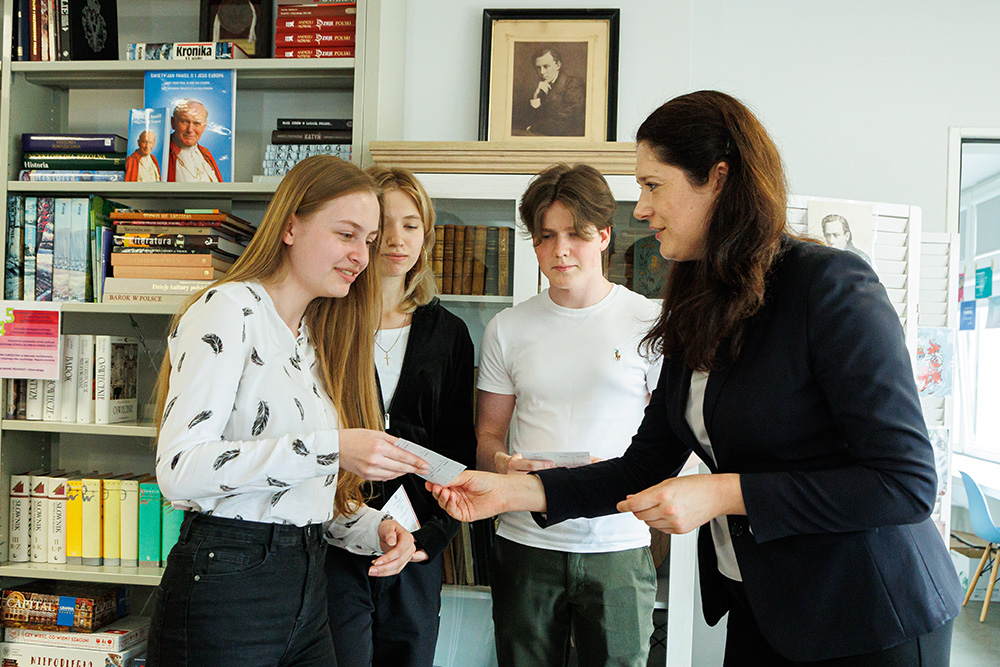- May 25, 2023
- 454
School ID card – patriotic and material dimension

Students of the junior high school of Władysław Syrokomla in Vilnius received school ID cards from the Consul of the Republic of Poland in Lithuania Irmina Szmalec. The document is available to students of Polish schools, teachers can also receive it.
The school ID card certifies the right to use reduced fares, admission tickets to museums and national parks throughout Poland.
– The document has, above all, a huge patriotic dimension. Our students get to know Poland by going to Warsaw, Krakow, Poznań as part of projects, sometimes entire classes use the ID card – Helena Marcinkiewicz, director of the junior high school of Władysław Syrokomla, points out in an interview with “Kurier Wileński”.
The application can be submitted individually or collectively
The act on the right for discounts for children and youth of Polish schools outside Poland entered into force in 2017. Issuing school ID cards, as well as extending their validity, is free of charge. The document is issued by the Consulate of the Republic of Poland in Lithuania.
“We hope that the interest in Lithuania will increase. It takes several days to process an application for a document, sometimes you can even get it on the same day when there is an urgent need – just before departure. The application can be submitted individually or collectively. All you need is a copy of your identity document and a certificate confirming your education in a Polish school”, says Irmina Szmalec, Consul of the Republic of Poland in Lithuania, to “Kurier Wileński”.
The students of Polish-language schools around the world can apply for this type of document. The condition is that the school where they study is registered in the ORPEG system, i.e. the Center for the Development of Polish Education Abroad.
Simplified issuing of school ID cards
An application for an ID card can be submitted through the school where the child is studying, as well as individually at the consulate. The application should be accompanied by documents confirming that the Polish language or other subjects were taught in Polish. If the application is submitted through the school, no additional documents have to be submitted, as the school will confirm the data of its students to the consul. The student ID card differs in design from the ID card received by school students in Poland. There is no photo of the student on it, which greatly simplifies its issuing. The ID card is valid with another document confirming identity (passport, ID card). It contains the name and surname and date of birth of the student, as well as the name of the school where he/she studies. In addition, the ID card has the name of the consulate, its stamp and the date of its validity.

Belonging to the group of Polish students and teachers
— The basis of the document is, first of all, belonging to the whole group of Polish students and teachers, which is a very patriotic dimension, so close to the heart of every Pole. The second dimension is measurable, material, because holders of a school ID card are entitled to discounts on railway travel, public transport, discounts to museums, national parks and others. – points out Renata Cytacka, chairwoman of the Forum of Parents of Polish Schools in the Solecznicki Region.
Gosia Cytacka from the junior high school of Władysław Syrokomla was the first in the Vilnius region to receive a school ID card No. 1/2017, with the date of issue: May 16, 2017.
— I have extended the document for another year for the fourth time. I often go to Poland, so the discounts I am entitled to are very important. For example, Wrocław has free public transport for students, so with this ID card I travel around Wrocław for free – says a 10th grade student.
Applications for renewals are made in the same way as applications for ID cards – this can be done through the school. In the case of applications submitted individually to the consul, a document confirming the continuation of education must be attached.
Translated by Aleksandra Bukhovets within the framework of a traineeship programme of the European Foundation of Human Rights, www.efhr.eu.

